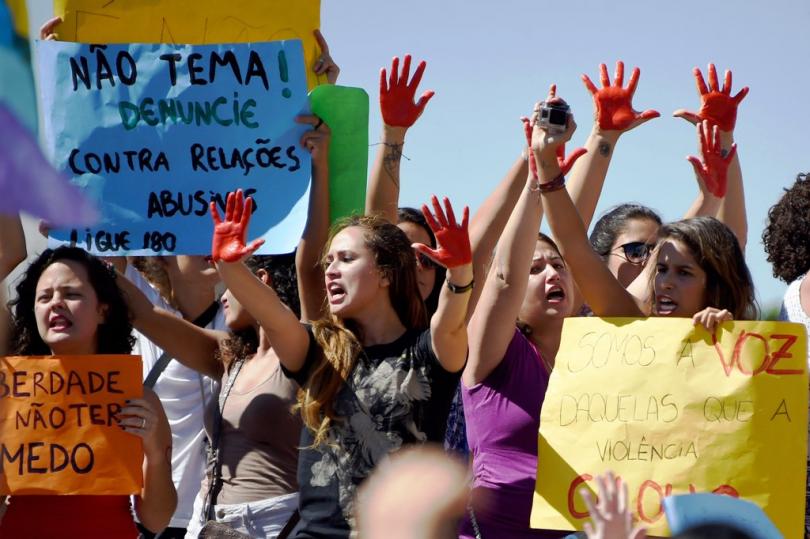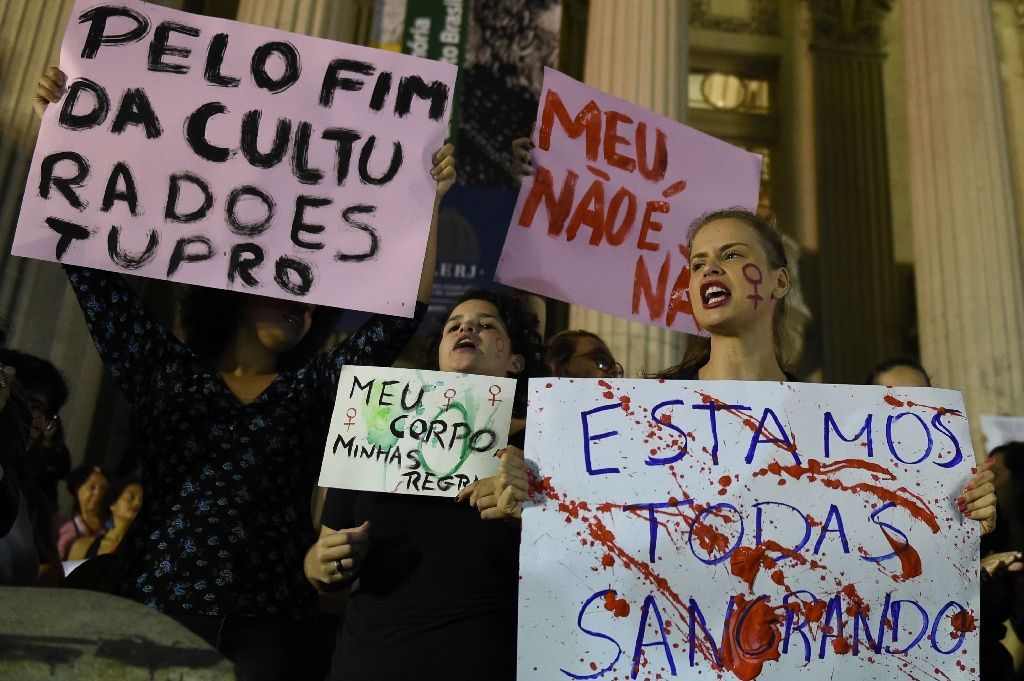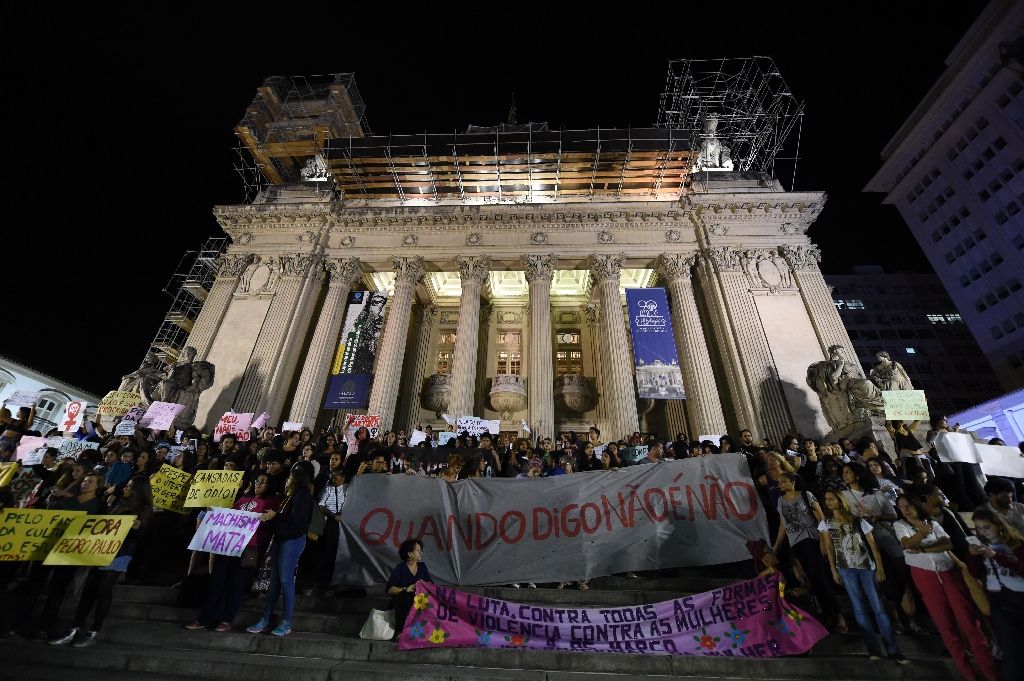“Across the world, violence against women and girls remains one of the most serious—and the most tolerated—human rights violations,” — UN Women Executive Director Phumzile Mlambo-Ngcuka.
A 16-year-old girl was allegedly raped by over 30 men in a Rio de Janeiro favela. Among the 30 men, not one of them stopped to ask why? Her body and all of her rights were completely violated. She was filmed with her vagina bleeding and men laughing in the background. The video was liked by more than 500 people on the Twitter feed of one of the rapists. She was unconscious. She had been raped by over 30 men.
This heinous crime was then transformed into a joke on social media. “They knocked her out, understand?,” read one of the comments. The girl’s grandmother told CBN radio that the she used to go to favelas and at times would be away for days without any news. She also revealed that she had been a drug user for around four years, and was the mother of a 3-year-old boy.
Soon, the victim’s personal life gave way to excuses for the crime, giving continuity to the machinery of rape culture that normalizes such horrible acts of violence. For some people, men in particular, it is easier to forget about the crime and focus on the victim. What follows is a cruel line of questioning that usually looks something like this:
“What if she were asking for it?”
“Oh, but wasn’t she a user?”
“Why did she go out, then?”
“Maybe she deserved it?”.
Visibly shaken, upon her release from the hospital, the girl told O Globo: “When I woke up, there were 33 guys all around me.”
Nothing can justify rape. Nothing.
She told the newspaper that she had gone to spend the night at her boyfriend’s house on Friday, and that she only woke up on Sunday, after everything had taken place. The investigation is ongoing.
Nothing can justify rape. Nothing.
Further, the practice of trying to direct blame  towards the victim is sad, disturbing and revolting. It is often perpetrated by relatively healthy men who live in a society in which relationships are guided by power and submission. This type of culture allows men to commit this type of crime and then delegitimize the victim.
towards the victim is sad, disturbing and revolting. It is often perpetrated by relatively healthy men who live in a society in which relationships are guided by power and submission. This type of culture allows men to commit this type of crime and then delegitimize the victim.
Rape is the cruelest way for a man to show a woman “who’s in charge.” Rape is not sex, it is not an exchange of emotion, it is not affection. Rape is a clear demonstration of power over another person. It is violence, it is constraint, it is violation, it is torture, it is disrespect, it is cruelty, it is atrocity, it is a crime which manifests itself in various ways.
More than accepted, rape is taught. From the time we are young, we are taught to protect ourselves. It is assumed that because we belong to the female sex, we will be attacked, violated at some point in our lives (in fact, it is estimated that nearly one in every five women will be a victim of sexual abuse during their lifetime). However, with boys, the cult of the “phallus” and open legs, free and ready to take charge, rules the day.
It is as part of this unbalanced cycle in which these children become adults.
Men who rape are not far away. Men who believe that women exist solely in relation to themselves are not far away. Women are abused every 11 minutes in Brazil. And we must not forget that until 2009, rape was considered a crime against honor. Even today, in 2016, rape is one of the least reported and most silenced crimes in Brazil.
Around 50,000 cases of rape are registered every year in Brazil, and it is estimated that this represents only 10 percent of the actual number of cases. An abused woman, most of the time, withdraws her complaint in fear of retaliation, shame of being exposed, fear of being judged for violence that another has committed against her.
We repeat, relentlessly, that women are treated like objects, so that cases like this one do not take place. And so that they understand, for once, that women want autonomy over their own bodies because (surprise!), we have that right. We have the right to say no. The right to report. The right to not want to be converted into an object ready to be used and thrown away. The right to walk the streets peacefully, to be respected, to point fingers, to speak.
It is easy and selfish to back down from the powerful. We look at the rapist as a “normal guy.” Sometimes, it’s because that’s exactly what he is. The vast majority are right beside us. It is a father, a boyfriend, a grandfather, a brother, a husband, a neighbor, an uncle. Society justifies and pardons the criminal, to the same extent in which it blames the victim.
We are more beautiful when we are together. And when we are angry.
It is necessary to break this vicious cycle of power that inhabits people’s minds. It is a cultural matter. It is deep rooted, and it is oppressive. What is so liberating about invading another’s body together with 30 other people, and then disclosing this publicly? Where is the romance in domination, in violence against another? In silencing rights, in exercising power? How can anything positive and pleasurable emerge from all this?
Some men may show solidarity with the case and even be revolted by other men. But this means nothing if the same man pats a friend’s back when he makes an objectifying comment, or if he doesn’t recognize the poisonous machismo in himself. Look, 30 men. None of them asked why. None of them stopped participating in the crime.
We exist in a society that uses every opportunity to subjugate, violate, disrespect and crush the rights won over by women. Clearer than this, for me, is the feeling that we can only trust in each other: only another woman is capable of understanding what that means.
There’s no use in expecting something to be done if we keep our arms crossed. There’s even less point in expecting something from governors who choose to invite Alexandre Frota to speak about education; who wind up the Ministry of Human Rights, Racial Equality and Women and who create a “secretariat,” headed by a woman who is a “defender of the family and life from conception” in its place; who ensures that PL/5096, which withdraws rights already won by women, is presented for voting and approved.
The statement by Phumzile Mlambo-Ngcuka, Under-Secretary-General of the UN and Executive Director of UN Women, is increasingly clear. Violence against women is still the world’s most tolerated human rights violation.
A case like this is about all of us. It reminds us of who we are and the long road we have ahead of us. We will not be quiet. We will speak out even for those who cannot speak for themselves. We will be reborn with very gesture, in every tear.
We are more beautiful when we are together. And when we are angry.
This post first appeared on HuffPost Brazil. It has been translated into English and edited for clarity.


